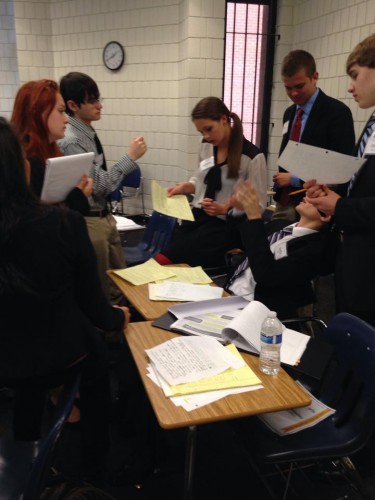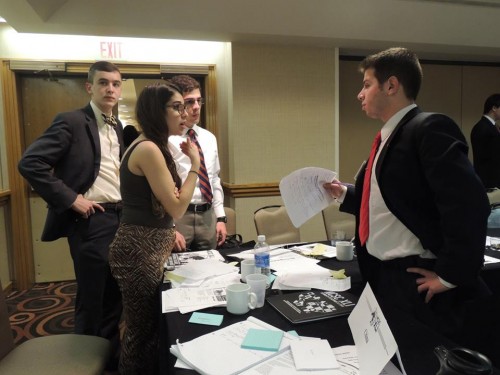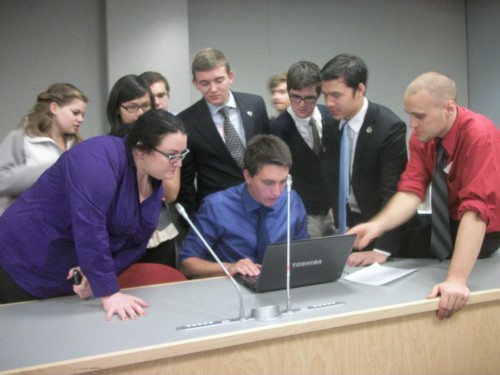Social Leadership in MUN: Redefining the “Power Delegate”
We’ve all been in committees with delegates who come out of the gate as aggressively as possible and let their competitive drive shine through as they make vitriolic speeches and regard any other paper on the floor as a joke. The first unmoderated caucus comes around and you immediately see the United Kingdom or France walk to the front of the room, waving their placard, yelling “IF YOU ARE A EUROPEAN COUNTRY OR HAVE BEEN SENDING NOTES WITH US YOU NEED TO MEET US RIGHT HERE!!!”, while at the back of the room you’ll hear China or India shouting “IF YOU ARE A DEVELOPING COUNTRY YOU HAVE TO COME HERE!!!”, immediately alienating half the room but giving the other half of the delegates some direction if they were unsure what to do. They can often be heard referring to “my paper” rather than “our paper”, and can be seen ordering delegates around the room to do minor tasks for them, like “go bring Russia over here”.

These delegates, who are often referred to with the laudatory title of “Power Delegate” are a regular fixture in any Model U.N. conference, and are often expected to get the best awards in committee. By calling them “Power Delegates”, we’re just validating that their tactics and attitudes about Model United Nations are the proper way to go about things. When we stop to think about it, this is counterintuitive. Model United Nations (except for crisis committees) it about simulating real world international organizations founded on diplomacy and collaboration, almost always with a “1 country, 1 vote” policy to emphasize the equal representation and respect to be accorded to each nation. Though we sometimes think that being aggressive and overpowering is the best way to get awards, when somebody actually comes along who can lead through collaboration, friendliness, and respect, they almost inevitably get the proper recognition for their work. We just need to learn where the line between leading versus commanding, debating versus bullying, and collaborating versus stealing ideas lies, and strive for the right path even though it may be less clear.
Example 1:
It’s the first or second session of the conference, and after listening (or not listening) to the speeches of your fellow delegates as they share ideas for potential solutions, the first unmoderated caucus comes up.
DO: Send notes before the caucus occurs to try to open up working relationships with other delegates. Explain to them why their ideas are compatible with yours, and why you really like what they have to say (being responsive to other delegates’ speeches is important). Seek out other delegates and ask them if they’re willing to meet with a group outside, and listen to everybody’s ideas.
DON’T: Don’t yell for/at people. Don’t grab the microphone to direct delegates to meet in a specific location. Don’t tell people who they need to/ have to be working with.
Example 2:
There’s a working paper on the floor that was written by some inexperienced delegates and is currently being debated. You disagree with many of the clauses and there are a lot of things factually or structurally wrong with the paper, and you’re next up on the Speaker’s List.

DO: Explain why, because of national policies, your country can’t support this paper. Address your concerns about any factual inaccuracies, but follow them up with an interest in amending or working with the authors on these issues. Make sure to find a clause or two to highlight as a constructive or innovative idea that you really like to commend them on, and express your interest in meeting with this group to work out your differences.
DON’T: Don’t go overboard with explaining why this is a bad paper or why it’s all wrong and should be ignored by the committee. Don’t make it sound like the authors of this paper are stupid or don’t know what they’re doing.
Example 3:
Your committee is getting close to the stage where you need to start submitting draft resolutions, but there is still some work to go. You’re about to recess for the day and reconvene the next morning, and you realize that some work will need to be done with your block outside of committee.
DO: Get Dinner (or Breakfast/Lunch) with your working group with the expressed purpose of not getting any work done. This is a great way to build relationships with your group and actually develop a friendship that will motivate people to work together. Sit down with the group and do a round robin on what everybody wants to work on and think should be added. Encourage everybody to speak about the work they’ve done specifically to the rest of the body so that everybody can see how collaborative your paper is. Thank everybody profusely for the amount of work you’re all doing, and say how excited you are to see the great paper you’ve all written together come forward.
DON’T: Don’t give out assignments to delegates you’re working with to finish for the next day (example: you write a clause on the educational program in developing nations, you write 2 clauses on best practices/expertise sharing programs). Don’t make your bloc sit around while you type out clauses, ignoring them. Don’t tell people that they have to meet at a specific time the next morning if they want to be listed as a sponsor.

Obviously many of these decisions seem intuitive, but its’ always important to emphasize building a strong relationship with the people in your committee. At conferences you’ll be collaborating with a large group of highly intelligent delegates who’ve done extensive research, and everybody has something they can contribute. By exercising Social Leadership you can embody what Model U.N. is all about and bring home the awards, while also making new friends, being well liked, and having a good time. Let’s stop worrying about the “Power Delegates” and start trying to become “leaders”, because that’s really what Model UN is about.

